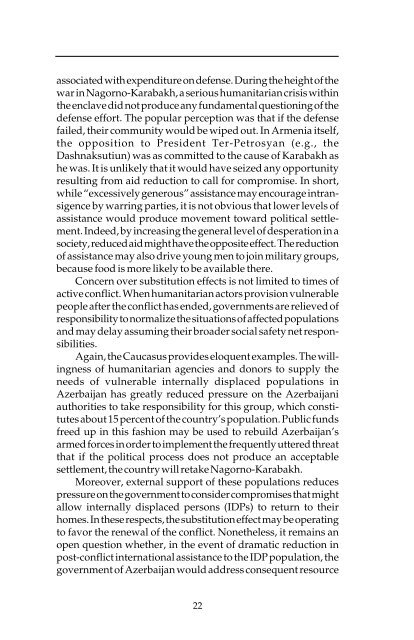Brown Cover OP 43 - The Watson Institute for International Studies
Brown Cover OP 43 - The Watson Institute for International Studies
Brown Cover OP 43 - The Watson Institute for International Studies
Create successful ePaper yourself
Turn your PDF publications into a flip-book with our unique Google optimized e-Paper software.
associated with expenditure on defense. During the height of the<br />
war in Nagorno-Karabakh, a serious humanitarian crisis within<br />
the enclave did not produce any fundamental questioning of the<br />
defense ef<strong>for</strong>t. <strong>The</strong> popular perception was that if the defense<br />
failed, their community would be wiped out. In Armenia itself,<br />
the opposition to President Ter-Petrosyan (e.g., the<br />
Dashnaksutiun) was as committed to the cause of Karabakh as<br />
he was. It is unlikely that it would have seized any opportunity<br />
resulting from aid reduction to call <strong>for</strong> compromise. In short,<br />
while “excessively generous” assistance may encourage intransigence<br />
by warring parties, it is not obvious that lower levels of<br />
assistance would produce movement toward political settlement.<br />
Indeed, by increasing the general level of desperation in a<br />
society, reduced aid might have the opposite effect. <strong>The</strong> reduction<br />
of assistance may also drive young men to join military groups,<br />
because food is more likely to be available there.<br />
Concern over substitution effects is not limited to times of<br />
active conflict. When humanitarian actors provision vulnerable<br />
people after the conflict has ended, governments are relieved of<br />
responsibility to normalize the situations of affected populations<br />
and may delay assuming their broader social safety net responsibilities.<br />
Again, the Caucasus provides eloquent examples. <strong>The</strong> willingness<br />
of humanitarian agencies and donors to supply the<br />
needs of vulnerable internally displaced populations in<br />
Azerbaijan has greatly reduced pressure on the Azerbaijani<br />
authorities to take responsibility <strong>for</strong> this group, which constitutes<br />
about 15 percent of the country’s population. Public funds<br />
freed up in this fashion may be used to rebuild Azerbaijan’s<br />
armed <strong>for</strong>ces in order to implement the frequently uttered threat<br />
that if the political process does not produce an acceptable<br />
settlement, the country will retake Nagorno-Karabakh.<br />
Moreover, external support of these populations reduces<br />
pressure on the government to consider compromises that might<br />
allow internally displaced persons (IDPs) to return to their<br />
homes. In these respects, the substitution effect may be operating<br />
to favor the renewal of the conflict. Nonetheless, it remains an<br />
open question whether, in the event of dramatic reduction in<br />
post-conflict international assistance to the IDP population, the<br />
government of Azerbaijan would address consequent resource<br />
22

















